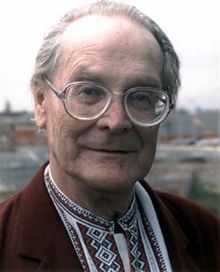Konstantin Buteyko
| Professor Konstantin Buteyko | |
|---|---|
 | |
| Born |
27 January 1923 Ivanitsa near Kiev, Kyivshchyna, Ukraine |
| Died |
2 May 2003 (aged 80) Moscow, Russia |
| Known for | Pioneering the Buteyko method |
|
Medical career | |
| Profession | Physician |
| Institutions | First Moscow Institute of Medicine |
| Specialism | Asthma and Respiratory disease |

Konstantin Pavlovich Buteyko (Russian: Константи́н Па́влович Буте́йко; January 27, 1923 – May 2, 2003) was the creator of the Buteyko method for the treatment of asthma and other breathing disorders.[1]
Early life
Konstantin Pavlovich Buteyko was born on 27 January 1923 into a farming family in Ivanitsa, near Kiev, Ukraine. His father was a keen mechanic and he followed this passion, studying mechanical engineering at Kiev Polytechnic. World War II interrupted this study however and he was sent to join a motorcade supplying the front lines. During the war, Buteyko had become tired of mechanics and made the decision to go into medicine.
When the War ended, I decided to start researching the most complex machine, the Man. I thought if I learnt him, I’d be able to diagnose his diseases as easily as I had diagnosed machine disorders.—Professor Buteyko, Interview in 1982
Medical training
In 1946 Buteyko enrolled at the First Moscow Institute of Medicine. He gained his degree with Honors in 1952 and became a resident. During his medical studies he was given a project of making observations on patients’ breathing rates in relation to the severity and prognosis of their illness. He soon came to the conclusion that there was an association between these two factors, such that as a patient’s condition became more severe so their breathing rate increased.
Buteyko reasoned that if there really was a connection between hyperventilation and illness it should be possible to reverse this by deliberate breath control. Having already made a study of several texts on yoga he was aware of exercises in breath restriction and so began to experiment both on himself and with his patients. These early trials became known as the Buteyko method.
Developing the method
By the early 1980s the Russian authorities were sufficiently impressed with Buteyko’s results to allow him a formal trial, or ‘approbation’ with asthmatic children in a Moscow hospital. Although very different in design from the standard controlled trial now predominant in the west, the results were sufficiently impressive to persuade the State Medical System to approve the method for widespread use.
The spread of the method
In the late 1980s an Australian businessman was admitted to hospital in Russia for treatment of an attack of angina. He was introduced to the Buteyko method (known in Russia as ‘Voluntary Elimination of Deep Breathing’ or VEDB) and found it extremely helpful. The Australian sponsored two Russian practitioners to teach the techniques in Australia. Within a short time, one of these people, Alexander Stalmatski was also training new teachers. The first blinded, controlled trial of Buteyko was carried out in 1994. Since then the Buteyko method has spread to numerous countries around the world with multiple organizations who have adopted the method.
Final years
Professor Buteyko died in Moscow, Russia on May 2, 2003, aged 80.
References
Publications
- Buteyko K. (1990). The Buteyko Method, An Experience of Use in Medicine. Moscow: "Patriot" Publishers.